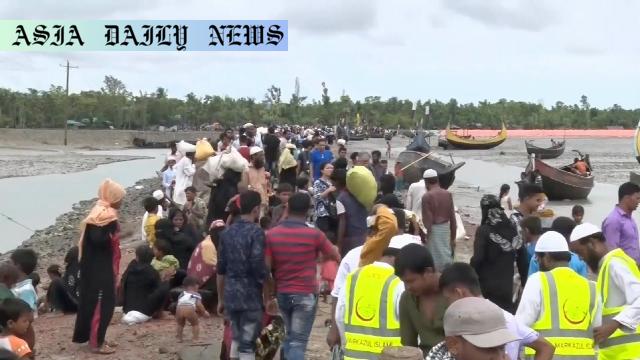Rohingya: UNHCR highlights 150,000 refugees fleeing Myanmar in 18 months, exacerbating Bangladesh’s humanitarian challenges.

Introduction: A Dire Crisis
The Rohingya crisis has once again escalated, compelling 150,000 members of this persecuted minority to flee their homes in Myanmar’s Rakhine state over the past 18 months. According to the United Nations High Commissioner for Refugees (UNHCR), their desperate flight to safety in neighboring Bangladesh is a direct consequence of continued persecution and political instability, especially following Myanmar’s 2021 coup. This marks the gravest wave of forced displacement since 2017, when over 700,000 Rohingyas fled to escape brutal violence.
The Scale of Humanitarian Challenges
With the arrival of these new refugees, Cox’s Bazar in southern Bangladesh, already home to the world’s largest refugee settlement, has been stretched beyond its capacity. Overcrowding and a lack of resources are dominant issues in the camps. Basic supplies such as food, safe drinking water, and medicines are running critically low. The current economic climate and competing global priorities have only exacerbated the situation, leaving humanitarian organizations underfunded and struggling to meet the growing demands.
Education is another critical area of concern. The UNHCR estimates that nearly 230,000 children living in these refugee camps face the possibility of losing access to education altogether. This sobering statistic reflects the extensive risk of generational stagnation and the loss of the potential future for thousands of young lives.
A Plea for International Solidarity
The UN refugee agency has issued an urgent plea to the international community to step up and address the crisis. They are calling for increased funding and humanitarian aid to provide life-saving assistance to the Rohingya. Essential resources such as healthcare, sanitation facilities, and livelihood opportunities for refugees must be prioritized in efforts to stabilize their precarious living conditions. The response from global leaders will undoubtedly influence the future trajectory of this enduring humanitarian crisis.
Historical Context and Current Insights
The Rohingya are a Muslim minority from Rakhine state in predominantly Buddhist Myanmar. Over the decades, they have faced persecution, being denied citizenship and basic rights under Myanmar’s laws. Their plight reached international attention in 2017 when a series of violent clashes between state forces and Rohingya militants resulted in mass killings and destruction of villages. Recently, Myanmar’s political instability, fueled by the military coup of 2021, has added another layer of complexity to their suffering.
Bangladesh, despite its limited resources, has consistently welcomed Rohingya refugees, showing remarkable humanitarian commitment. However, the growing pressure on Cox’s Bazar’s infrastructure, resources, and local communities has fueled tensions between host populations and refugees, further highlighting the need for sustained international support.
The Way Forward
The only lasting solution to the Rohingya crisis lies in addressing its root causes. This includes ensuring safety and citizenship rights for the Rohingya within Myanmar, alongside political reconciliation in the region. Until then, the global community must treat the situation as an urgent humanitarian priority. Strengthened funding for UNHCR and allied organizations will not only alleviate immediate suffering but also lay the groundwork for long-term stability.
Conclusion: A Call to Action
The resilience of the Rohingya people serves as a stark reminder of humanity’s collective responsibility to stand against injustice. The international response to their plight will not just define the future of millions but also reflect our commitment to the values of compassion and human rights. Let this crisis be a call to action for global solidarity, generosity, and justice.
Commentary
The Unrelenting Plight of the Rohingya
The Rohingya crisis is one of the gravest humanitarian challenges of our time, and yet, it often feels like their plight doesn’t receive the consistent attention it deserves. Their experiences not only highlight the consequences of xenophobia and institutionalized discrimination but also serve as a test of humanity’s willingness to act in the face of such injustice. Over 150,000 people, forced to abandon their homes due to persecution in the last 18 months, paint a story of desperation that no one should have to endure.
Global Responsibility and the Need for Solidarity
What makes this crisis even more pressing is the critical lack of resources in refugee camps like Cox’s Bazar. Bangladesh has done an admirable job by opening its borders, despite its own economic difficulties, but the responsibility cannot rest solely on one nation. The international community must step in with financial and logistical support, ensuring the Rohingya receive basic necessities like food, healthcare, and education. Without sufficient aid, the risk of malnutrition, disease outbreaks, and lost generations of children will only grow.
A Hope for Justice for the Rohingya
The solution to the Rohingya crisis lies beyond humanitarian aid—it requires addressing the structural roots of their oppression. The restoration of their citizenship rights within Myanmar and geopolitical stability are critical milestones toward ensuring lasting peace. While such a resolution may take years, it is crucial that the world does not forget the Rohingya in the meantime. Their resilience is inspiring, but resilience alone should not be confused with the fulfillment of basic human rights. Justice delayed, in this case, will be justice denied.
The story of the Rohingya is a global issue that demands collective action. Let us remember that standing by in silence is no longer an option. It is our moral obligation to act now, creating pathways for hope and dignity.


